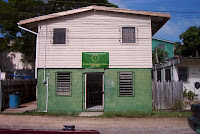 From July 24-28 I attended the 119th session of Northwest Yearly Meeting of Friends Churches (NWYM) at George Fox University in Newberg Oregon. Northwest Yearly meeting is an evangelical Yearly Meeting made up of programmed churches in Oregon, Washington, and Idaho. NWYM is the meeting I have been connected with all my life as a Quaker (30 some years) until I moved to Richmond last summer. This summer it seemed strange to attend as a “visitor,” but it was wonderful to see so many long-time friends.
From July 24-28 I attended the 119th session of Northwest Yearly Meeting of Friends Churches (NWYM) at George Fox University in Newberg Oregon. Northwest Yearly meeting is an evangelical Yearly Meeting made up of programmed churches in Oregon, Washington, and Idaho. NWYM is the meeting I have been connected with all my life as a Quaker (30 some years) until I moved to Richmond last summer. This summer it seemed strange to attend as a “visitor,” but it was wonderful to see so many long-time friends. The keynote address was the last message given by the outgoing YM superintendent
The keynote address was the last message given by the outgoing YM superintendentColin Saxton. Colin has served seven years as superintendent of NWYM and will be
moving to Richmond to become the General Secretary of Friends Uniting Meeting in January 2012. There is a great sadness in NWYM with Colin’s departure as he is deeply loved, respected and admired. The only person there who felt joyful about his coming to Richmond was, of course, me!
 Before Colin delivered his message, he introduced Rebecca (Becky) Ankeny whose nomination to become Superintendent was approved a few days later by the business meeting. Becky is a faculty member in the Literature & Writing Department of George Fox University and has also held administrate posts there. Becky will become the first female superintendent of NWYM. At the session to
Before Colin delivered his message, he introduced Rebecca (Becky) Ankeny whose nomination to become Superintendent was approved a few days later by the business meeting. Becky is a faculty member in the Literature & Writing Department of George Fox University and has also held administrate posts there. Becky will become the first female superintendent of NWYM. At the session toapprove her nomination a number of people spoke to the importance of the Quaker testimony to the equality of women and men, and some lamented the failure to consistently maintain it over time within the YM. When the recommendation of Becky was finally approved by the meeting, and she was called in to hear the announcement, she was given a standing ovation. Becky’s parents were missionaries and she grew up in Northwest YM. She is a graduate of George Fox College and the University of Oregon.

The theme of the 2011 sessions was “In Christ—one people—growing together” and the key biblical text: Eph. 4:13. The YM brochure reminded everyone that “True spiritual maturity is most fully expressed in community. When individual members experience the connecting power of the Holy Spirit and when our differences and disputes are surrendered to Jesus, we find a unity that transcends our diversity. We have a new purpose and direction.”
The theme of love and unity amidst conflicting viewpoints was a consistent thread throughout the sessions. Colin made
 a point in his keynote to speak to people on the “poles” --those on the conservative and liberal ends of the YM --asking them to listen to each other and have respect for one another even if they have divergent perspectives. To facilitate this theme of unity and lay the groundwork for working through conflicts, some business sessions were laid aside for small groups to prayerfully share their experiences of times when differences of opinions divided them and times when conflict was transcended.
a point in his keynote to speak to people on the “poles” --those on the conservative and liberal ends of the YM --asking them to listen to each other and have respect for one another even if they have divergent perspectives. To facilitate this theme of unity and lay the groundwork for working through conflicts, some business sessions were laid aside for small groups to prayerfully share their experiences of times when differences of opinions divided them and times when conflict was transcended. In two evening sessions Jan Wood from Seattle, Washington, presented messages on unity amidst diversity. (Jan also spoke at Indiana Yearly Meeting this year). Five people were recorded as ministers this year. One, Leslie Murray, a good friend
In two evening sessions Jan Wood from Seattle, Washington, presented messages on unity amidst diversity. (Jan also spoke at Indiana Yearly Meeting this year). Five people were recorded as ministers this year. One, Leslie Murray, a good friendof mine, is a Youth Pastor and a dynamic young leader in NWYM. I was delighted to be able to attend a gathering in celebration of her gifts.
On the final night, a closing banquet was held honoring the five ministers who were approved for recording, and celebrating the golden anniversary of Friendsview Manor, a lovely retirement community in Newberg, OR.
 Carole Spencer serves as Associate Professor of Christian Spirituality at Earlham School of Religion. She is a recorded minister in Northwest Yearly Meeting.
Carole Spencer serves as Associate Professor of Christian Spirituality at Earlham School of Religion. She is a recorded minister in Northwest Yearly Meeting.














